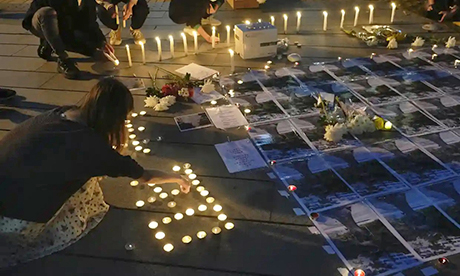Church services in Hong Kong to commemorate the 1989 Tiananmen Square crackdown have been cancelled amid fears of breaching security laws.
Beijing imposed a sweeping national security law in 2020 to snuff out pro-democracy demonstrations.
The security law has effectively erased reminders of China’s bloody suppression of the protests in the Chinese capital 33 years ago.
Candlelit vigils have been banned, a Tiananmen museum has been forced to close and statues have been pulled down.
The Hong Kong Catholic diocese announced that it would no longer hold a memorial Mass to pray for the victims of the massacre.
The annual Catholic masses were one of the last ways for citizens of Hong Kong to come together publicly to remember the deadly clampdown in Beijing on 4 June 1989, when the Chinese government set tanks and troops on peaceful demonstrators.
But this year, they too have been cancelled over fears of falling foul of Hong Kong authorities.
“We find it very difficult under the current social atmosphere,” said Rev Martin Ip, chaplain of the Hong Kong Federation of Catholic Students, one of the organisers.
“Our bottom line is that we don’t want to breach any law in Hong Kong,” he said.
The church’s move comes after the candlelight vigil that once featured thousands marking the anniversary at an outdoor park was banned in 2020 and 2021. At the time, authorities suggested that the coronavirus pandemic was the cause of the cancellation.
The Catholic Church’s memorial Masses were the last form of organised commemoration in the city.
The “Pillar of Shame” in the University of Hong Kong (HKU), an eight-metre-high sculpture by Danish artist Jens Galschiot, was dismantled, tucked into a cargo container and left on an HKU-owned plot of rural land.
At Lingnan University, a wall relief by artist Chen Weiming was banished to an underground storage room.
His “Goddess of Democracy” statue at the Chinese University of Hong Kong was sent to a secretive “safe place”.
“They are trying to wipe out a shameful episode in history when the state committed a crime on its people,” Chen said.
Instead, the space for remembering the crackdown now lies outside Hong Kong, with exiled dissidents setting up their own museums in the US and activists planning to resurrect the Pillar of Shame in Taiwan.
On June 4, vigils will be held globally, with rights group Amnesty International coordinating candlelit vigils in 20 cities “to demand justice and show solidarity for Hong Kong”.
Tiananmen Square survivor Zhou Fengsuo, who lives in the US, said that in recent years he had seen more people joining such events in the west, including recently emigrated young people from Hong Kong.
“I am grateful that Hong Kong for the last 30 or so years has carried the torch of commemorating Tiananmen,” Zhou said. “Now, it’s our job to do it outside of Hong Kong.”
Sources
Additional reading
News category: World.




